
Sheryl Barker lives near Cincinnati, Ohio with her husband Rick and daughters Amy and Lauren. They attend Royal Redeemer Lutheran Church in Liberty Township, Ohio, and are actively involved in a Bible study for former Adventists in Dayton, Ohio. She graduated from Spring Valley Academy in 1982, attended Andrews University, and earned an accounting degree from Indiana Wesleyan University.

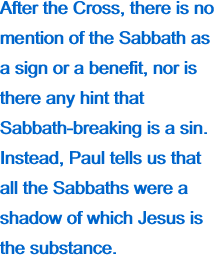
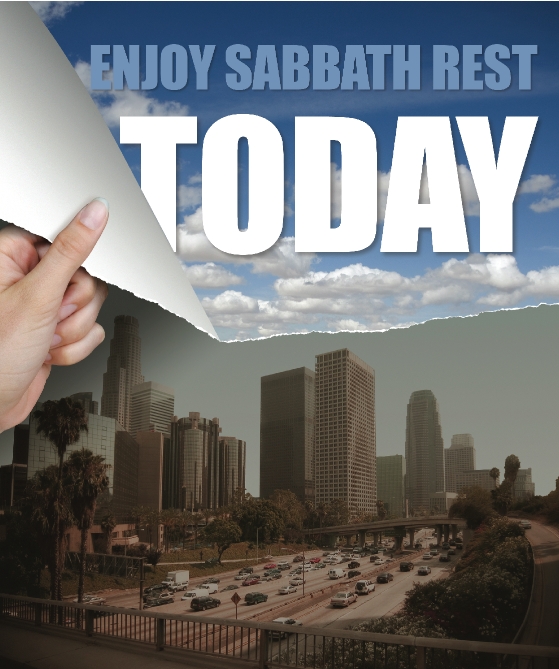
HOME / PROCLAMATION! MAGAZINE / 2011 / OCTOBER NOVEMBER DECEMBER / ENJOY SABBATH REST TODAY
Introduction
The common understanding of Sabbath today is influenced primarily by the fourth commandment. Christians vary, however, in their interpretation of how Sabbath rest fits in the new covenant. Some consider it to be a specific day of physical rest for spiritual renewal; others interpret it to be a regular time period for the same purpose. This article takes a deeper look at Sabbath: common paradigms, its beginning, history, and purpose, and finally, we will discuss what Sabbath means for a Christian by exploring the "Today" paradigm of Hebrews 3 and 4. It is important to note that since the cross we are in the freedom of the gospel and under the ministry of the Spirit, and therefore respect should be given for each view. Moreover, all moral commands apply 24 hours a day every day; only the ritual laws were recurring and periodic. The Sabbath command was never an unremitting moral command; it recurred every seven days. Thus, Sabbath is now a matter of conscience as stated in Romans 14:5: "One person regards one day above another, another regards every day alike. Each person must be fully convinced in his own mind." All verses are quoted from the NASB translation.
Common paradigms
The following chart briefly outlines the main paradigms various Christians hold today regarding the Sabbath:
The Christian Sabbath
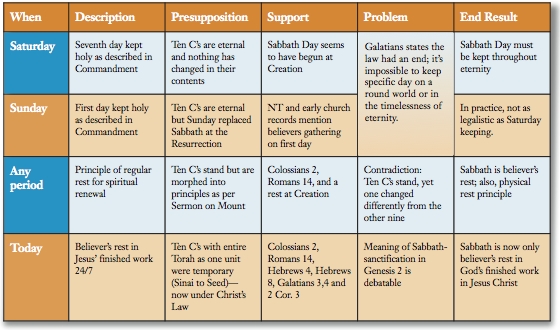
The Saturday-paradigm group believes that the seventh-day Sabbath along with the entire 10 Commandments have existed from eternity and will always be in existence exactly as they are written. They believe it is essential for true Christians to keep the seventh-day Sabbath holy from sundown Friday to sundown Saturday as a sign of their allegiance to God, and they believe they will continue to do so in the new heaven and new earth throughout eternity. The main support for this view is that both Exodus 20 and Genesis 2 suggest that the Sabbath has existed at least since creation, pre-sin. Further support for seventh-day observance is derived from verses stating the Sabbath is a perpetual covenant (Ex. 31:16; Lev. 24:8; Is. 46:6), that in the new heaven and new earth all will come to worship God from Sabbath to Sabbath and from new moon to new moon (Is. 66:23), and that God is the same yesterday, today, and forever and states, "I change not" (Mal. 3:6). The main problems with this interpretation are the verses that state the law was temporary (Gal. 3:15-26), that a change in the priesthood required a change of the law (Heb. 7:12), and that the new covenant replaced the old (Heb. 8; 2 Cor. 3) besides the impossibility of keeping a literal day in every part of the world, let alone in the timelessness of eternity. Finally, there is the additional problem, as the Jews discovered, of figuring out exactly how the Sabbath should be kept.
The Sunday-paradigm group has the least biblical support of the four. There is no indication in the Bible that the seventh-day Sabbath as stated in the commandments was transferred to the first day of the week. There is, however, evidence that believers in the New Testament met on the first day of the week, thus explaining why this group supports changing the day in the commandment. The Saturday group has a rebuttal for each mention of the first day in the New Testament as to why it was not really a regular church day, and the verses are a little ambiguous. If the command is still in place as it is written but now applies to a different day of the week, the Bible should certainly have made that perfectly clear, and it does not. This group is usually not as legalistic in their Sunday-keeping as the Saturday group is with theirs, and most do not observe the day from sundown to sundown.
The Any-Period-of-Time-paradigm group is one that believes the Ten Commandments stand as a unit and therefore the Sabbath command still applies in some sense, but Jesus' Sermon on the Mount in Matthew 5 allows for the application of a Sabbath-principle rather than observance of a specific day. It is usually further asserted that a weekly rest is part of the natural cycle that began at creation. The Sabbath command is now viewed as taking regular time (a day or part of a day) to rest physically and to renew relationships with God and other believers. This practice includes a church day which is normally on Sunday, but it can be any day. The main problem with this view is that the Bible does not address the Sabbath in the New Testament as a beneficial time period for the believer—or, for that matter, as any type of command. Furthermore, the Sabbath commandment was not treated the same as the other commandments were in the Sermon on the Mount. The commandments Jesus addressed continued to mean not only what they meant in the Torah (do not kill, do not commit adultery) but also were taken to a deeper heart level (do not hate, do not look with lust). In contrast, none of the Sabbath commandment applies any longer as it is written, and neither Jesus nor the apostles taught observance of a Sabbath day. Thus, understanding Sabbath only as a principle at the heart level is inconsistent with the remaining commandments; therefore, we must see it as a different category of command.
The "Today"-paradigm group believes the Sabbath day was a symbol of the original rest that people had in an unbroken relationship with God before sin and a foreshadow of the believer's rest in Jesus that restores one's relationship with God through the cross and the resurrection. Support for this view is found primarily in Hebrews 4, and it agrees with the biblical evidence that there is no Sabbath time-period command for Christians.1
The following table outlines the way the old covenant law is understood from the perspective of the "Today" paradigm:
"Today" paradigm's presupposition: view of old covenant law
The Ten Commandments are viewed as the summary of, or table of contents to, the entire Mosaic Law which is expounded in the first five books of the Bible, or Torah, and within which Jews have specifically counted 613 total commands. See Exodus 20 through 31, Exodus 34:1-28, Deuteronomy 4:13, and Deuteronomy 5 for evidence that:
- God only spoke the Ten Commandments before the children of Israel said they were afraid to hear more, so God spoke the rest of the commands to Moses.
- Much of the rest of the law God spoke to Moses was an elaboration of the Ten Commandments.
- The law God spoke to Moses ends with discussion of the Sabbath as a sign between God and the sons of Israel.
- The Ten Commandments are called "the covenant" and "the words of the covenant".
- This covenant (Ten Commandments, entire law spoken by God from Mount Sinai) was only made with the children of Israel, not with their fathers (Abraham, Isaac, and Jacob).
The entire law God gave at Mount Sinai, which specifically includes the Ten Commandments and is further elaborated throughout the first five books of the Bible, is the old covenant, as one unit. See Galatians 3:15-19, 2 Corinthians 3:4-17, Galatians 4, and Hebrews 8:13 for evidence that:
- The Law was temporary, given 430 years after the promise to Abraham and was to last only until the Seed.
- The "letters engraved on stone" were "the ministry of death" that faded away; they were replaced by the ministry of the Spirit, the new covenant.
- The old and new covenants are contrasted allegorically between Mount Sinai (bondwoman) and New Jerusalem (free woman), with instruction to throw out the bondwoman.
- The Old Covenant became obsolete at the rending of the veil and disappeared in AD 70 in the destruction of Jerusalem.
The old covenant commands, with the entire law and the prophets, depend on and derive from the greatest commandments. These are found in Deuteronomy and stated by Jesus in Matthew 22:36-40: "You shall love the Lord your God with all your heart, and with all your soul, and with all your mind," and "you shall love your neighbor as yourself." This principle of Love is part of who God is in character and is an overarching principle through all eternity. It is also the essence of Christ's law of the New Testament, to love one another (Jn. 13:34) and bear one another's burdens (Gal. 6:2). These "greatest commandments" trump the law, and believers are not under the old covenant law but are under Christ's law, ministered through the Spirit and not by the letter (Rom. 6:6; 2 Cor. 3). There are many specific instructions given in the New Testament explaining what this love in action does and does not look like (see for example Mt. 5, Gal. 5:16-25). In other words, the law of love is not "shorthand" for the 10 Commandments; rather, the law of love eclipses the 10 Commandments when we are in Christ.
In the beginning
The Sabbath day as a noun is first mentioned in the Bible in Exodus 16, but the commandment in Exodus 20 refers back to Creation as the reason for the Sabbath command.
"For in six days the Lord made the heavens and the earth, the sea and all that is in them, and rested on the seventh day; therefore the Lord blessed the Sabbath day and made it holy" (Ex. 20:11).
This verse is referring to Genesis 2:2, 3:
"By the seventh day God completed His work which He had done, and He rested on the seventh day from all His work which He had done. Then God blessed the seventh day and sanctified it, because in it He rested from all His work which God had created and made."
These verses at first glance seem to support the view that the Sabbath day began at Creation. There are good reasons, however, why a different interpretation provides a better fit with the rest of Scripture and with the freedom of the Gospel.
Genesis 2 speaks only of God ceasing (the meaning of the underlying Hebrew word) from His finished work of creation and not about people resting. He did not take up creation work again on the day after the seventh day; it was completed once and for all. Interestingly, every creation day ends with the words "And there was evening and there was morning, one day" or second day, third day, etc. The seventh day is the only one that is not bracketed with those words. In other words, by the seventh day God had ceased from His work, and it was a day unlike the six days of creation: it had no beginning and no end. This grammatical detail conveys the reality that God's rest, or His ceasing from His work, and His consequent blessing and sanctifying of the unending seventh day, were intended to be perpetual. God's "rest" and "blessing" were not limited to only one physical day in every seven. In fact, the lives of Adam and Eve began at the beginning of that rest—they certainly had nothing from which to rest physically. There was no tiring work before sin, and Adam and Eve were in a right relationship with God at all times, so they needed no physical rest or spiritual renewal before sin. They were essentially created into a perpetual Sabbath that did not end until sin came and their relationship with God was broken.
Genesis 3 records God cursing creation after the fall into sin, and then Adam and Eve began to experience fatigue, pain, and spiritual separation. Still, God did not mention any Sabbath rest for them or for anyone else in Genesis. There is no indication from the biblical record that any person knew about or kept a Sabbath period of time until the Exodus.
The true beginning of a required Sabbath time-period as outlined in the commandment is recorded in Exodus 16. Like the ritual law of Passover, the Sabbath was given a few weeks before God gave the commandments at Sinai when He provided manna for the children of Israel and informed them there would be a double portion of manna on Friday that would keep an extra day. There would be none on the ground to gather on Sabbath. There is no mention before this time of any person observing a Sabbath day. This seemed to be new information which some people put to the test both by trying to keep extra manna on a day other than Friday, or by not gathering extra on Friday but willfully going out to find some on Sabbath.
Interestingly, the Torah gives two reasons for the children of Israel to keep the Sabbath. Exodus 20 cites God's resting, or ceasing, from His work of creation on the seventh day of creation. When the 10 Commandments are repeated in Deuteronomy 5, however, they are stated a little differently, saying Sabbath observance was for the purpose of remembering how God rescued them out of slavery in Egypt.
"You shall remember that you were a slave in the land of Egypt, and the Lord your God brought you out of there by a mighty hand and by an outstretched arm; therefore the Lord your God commanded you to observe the Sabbath day" (Deut. 5:15).
Here we glimpse what that day of rest symbolized: first, God created people in a sin-free, never-ending relationship with Him. That rest was entered on the seventh day after the six days of creation and was not interrupted until sin entered. Second, God rescued the children of Israel from slavery, beginning the journey back to that original rest.
Sabbath history
The Sabbath command was the very center of the old covenant for the children of Israel and was the sign of their special relationship with God as a nation.
"But as for you, speak to the sons of Israel, saying, ‘You shall surely observe My sabbaths; for this is a sign between Me and you throughout your generations, that you may know that I am the LORD who sanctifies you'" (Ex. 31:13).
Normally it is the seventh-day Sabbath that is thought of in this context, because it is the one specifically mentioned in the 10 Commandments. However, there were multiple Sabbaths for the children of Israel: weekly (seventh-day Sabbath), monthly (new moon festival), yearly (seven fixed annual feasts), the Sabbath year (every seventh year) and the jubilee Sabbath (Year of Jubilee—the 50th year). Leviticus 23 and 25 discuss in depth each of these Sabbath festivals, and they are all tied together as an integral part of the Israelite's life. Moreover, they are all treated the same: all are holy Sabbaths in which no labor was permitted. 2 Chronicles 8:12-13 lists many of these Sabbaths:
"Then Solomon offered burnt offerings to the LORD on the altar of the LORD which he had built before the porch; and did so according to the daily rule, offering them up according to the commandment of Moses, for the sabbaths, the new moons and the three annual feasts—the Feast of Unleavened Bread, the Feast of Weeks and the Feast of Booths."
Keeping the Sabbath holy was not optional, and God laid out some strict rules for how the Sabbath day should be kept in order to prevent any work. We know the rabbis added extensively to God's specifications with their interpretations and safeguard rules. The Bible, however, lists specific things which God instructed Moses and later prophets could not be done on the Sabbath. These include:
- Don't bake (Ex. 16:23)
- Don't work (Ex. 20:10)
- Don't travel out of your place (Ex. 16:29)
- Don't light a fire (Ex. 35:3)
- Don't buy or sell (Neh. 10:31)
- Don't do your own pleasure (Is. 58:13)
- Don't carry a load (Jer. 17:21-22)
Keeping the Sabbath as God specified was important enough that intentionally breaking it carried the death penalty:
"Therefore you are to observe the sabbath, for it is holy to you. Everyone who profanes it shall surely be put to death; for whoever does any work on it, that person shall be cut off from among his people. For six days work may be done, but on the seventh day there is a sabbath of complete rest, holy to the LORD; whoever does any work on the sabbath day shall surely be put to death" (Ex. 31:14-15).
Numbers 15:32-36 records an incident when God had Moses carry out this penalty on a man who gathered wood on the Sabbath day. These passages reveal the high importance God placed on specific Sabbath times of physical rest for the children of Israel as the sign of the Sinaitic covenant signifying that they were God's chosen people in relationship only to Him.
The Israelites' history reveals that they often broke the Sabbath. God often reproved and pleaded with them through His prophets to honor the Sabbath as well as to give up their idol worship. (See Neh. 13; Is. 56; 58; Jer. 17; Ez. 20-23; Amos 8).
In spite of the special place the God-given physical Sabbath rest had for the children of Israel, the record of the Gospels seems to indicate a transition away from the restrictive physical Sabbath introduced in Exodus toward its fulfillment when Jesus proclaimed the fulfillment of Jubilee. At the beginning of Jesus' public ministry, as recorded in Luke 4:17-19, Jesus quoted from Isaiah 61, stating:
"The Spirit of the Lord is upon me, because he anointed me to preach the gospel to the poor. He has sent me to proclaim release to the captives, and recovery of sight to the blind, to set free those who are oppressed, to proclaim the favorable year of the Lord… Today this Scripture has been fulfilled in your hearing."
This passage is often cross-referenced in Bibles to Leviticus 25 because the Year of Jubilee (the ultimate Sabbath) was about freeing the oppressed. The Jubilee, of which there is no record of its ever being observed, was fulfilled when Jesus proclaimed the beginning of His gospel ministry. Jesus' ministry was filled with many Pharisee conflicts over His breaking the Sabbath. He seemed to go out of his way to heal on the Sabbath, even telling a man to pick up his bed and walk (Jn. 5:8)—clearly against a prohibition given earlier by God not to carry a load, even a personal load as in the case of the man picking up sticks in Numbers. In Luke 6:4-6 Jesus calls Himself Lord of the Sabbath and made clear that He was not subject to its requirements. In addition, He defended His disciples' picking grain to eat on the Sabbath by equating it with David and his men eating the consecrated showbread: both acts were acceptable because both the Sabbath and the showbread restrictions were ceremonial, not moral.
In John 5:16-18 when the Pharisees accused Jesus of breaking the Sabbath, He did not deny it. Instead, He essentially said He was not subject to the Sabbath requirements by stating that both He and His Father have been and are working, which in turn caused John to say He was both breaking the Sabbath and making Himself equal to God—both of which were true (Jn. 5:18). This exchange further shows that since: a) Jesus was not subject to the Sabbath command He gave to the children of Israel, and b) exceptions to its historic observance were now being made from the time that Jesus began proclaiming the gospel and the Jubilee, therefore the command to honor the seventh day cannot be an eternal moral law. Rather, it was part of the ceremonial regulations foreshadowing redemption in Christ which found its fulfillment in Who Jesus actually is: Love and True Rest.
After the Cross, there is no mention of the Sabbath as a sign or a benefit, nor is there any hint that Sabbath-breaking is a sin. Instead, Paul tells us that all the Sabbaths were a shadow of which Jesus is the substance:
"Therefore no one is to act as your judge in regard to food or drink or in respect to a festival or a new moon or a Sabbath day—things which are a mere shadow of what is to come; but the substance belongs to Christ" (Col. 2:16-17).
These verses cover the annual Sabbath festivals, the monthly Sabbath festival, and the weekly Sabbath day, and they are listed in a similar order to the order they are presented many places in the Old Testament. (See Ez. 45:17 for an almost exact parallel.) Paul also tells us in Romans 14:5-6 that we have the freedom to regard any day or no day.
Sabbath purpose
It is easy to lose sight of the purpose of the Sabbath shadow when one focuses mostly on the shadow. The Sabbath given to the children of Israel was a physical rest symbolizing the future ‚spiritual rest that Jesus would give: "Come to Me, all who are weary and heavy-laden, and I will give you rest" (Mt. 11:28). There are several ways the Sabbath was a shadow of the salvation rest Jesus came to give (see chart).
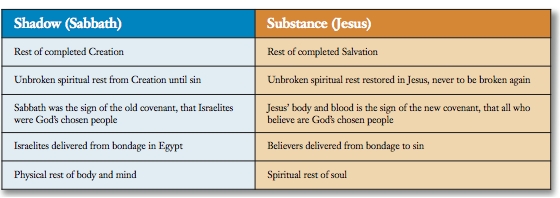
Like the other shadows of the Old Testament, the Sabbath shadows (period of time: weekly, monthly, annual) pointed to things the Israelites could not fully understand at the time and were a physical representation of a future spiritual reality—albeit a reality set from the foundation of the world. These shadows were fulfilled in Jesus; the Substance replaced all shadows.
Christian meaning
Like most of the Old Testament ceremonies and ordinances, Sabbath shadows could not be entirely understood until after their fulfillment when the Gospel was more fully revealed to the apostles:
"By referring to this, when you read you can understand my insight into the mystery of Christ, which in other generations was not made known to the sons of men, as it has now been revealed to His holy apostles and prophets in the Spirit; to be specific, that the Gentiles are fellow heirs and fellow members of the body, and fellow partakers of the promise in Christ Jesus through the gospel" (Eph. 3:4-6).
Any paradigm that does not allow the New Testament to interpret the Old Testament, or does not line up with the teaching of the Gospel, is not complete truth. Jesus is the fullest revelation of God's Word to us. Thus, we need to look closely at what the New Testament teaches about the Sabbath to know how it fits with the Christian.
The book of Hebrews is an excellent resource explaining that all Old Covenant shadows were fulfilled in Jesus (see chart).

It is abundantly clear through studying Hebrews that the old is out and the new is in. Moreover, Hebrews show that God's true rest was never the seventh-day Sabbath. There has been a change; the old is obsolete. Yes, this change even includes the Sabbath: there was a Sabbath shadow, and just as with the other shadows, the fulfillment of that shadow is all that actively remains. We need to know what that fulfillment looks like since now we live in it.
Beginning in Hebrews 3:12 and going through Hebrews 4, the writer of Hebrews contrasts between the rest the children of Israel did not obtain and the rest that is available to all who believe: "For we who have believed enter that rest" (Heb. 4:3). Here we find the first generation of Israelites to come out of Egypt did not enter the rest of the Promised Land because of their unbelief. Later, Joshua did give them physical rest in the land, but they never entered God's rest. Observing all the various physical Sabbaths as a sign of that old covenant relationship were only shadows pointing to the believer's restored relationship with God, entered through belief. In this saving relationship, the believer sets aside and rests from all his works because they are unable to save. Only belief in Jesus saves.
Hebrews 4:4 and 7 is where we find the shadow day versus the believer's day. "For He has said somewhere concerning the seventh day: ‘And God rested on the seventh day from all his works'…He again fixes a certain day, ‘Today,'". This is essentially saying that God's rest, or His ceasing from His work on the seventh day, provided the basis for the shadow of physical rest on the seventh day. That day was fixed for the children of Israel. After the cross, God again fixes a certain day—this time for the believer's rest—"Today".
When is today?
It is always today, every moment, 24/7. Once we believe in Jesus, we find our spiritual rest in Him every moment of every day. As believers, we have passed from death to life (Jn. 5:24); we have been rescued from the domain of darkness and transferred to the Kingdom of the Son (Col. 1:12-14), and we already are seated in the heavenly places in Christ Jesus (Eph. 2:4-8). Believers are in that spiritual rest now.
It is interesting to note in Hebrews 4:8 that the physical Sabbath rest did not provide spiritual rest. If it had, God would not have needed to speak of another day, Today. Verses 9-11 explain what this believer's rest is:
"So there remains a Sabbath rest for the people of God. For the one who has entered His rest has himself also rested from his works, as God did from His. Therefore, let us be diligent to enter that rest, so that no one will fall, through following the same example of disobedience."
It was already stated the physical Sabbath-day rest did not save and did not provide spiritual rest, but this "Sabbath-like rest" (a unique word found nowhere else in Scripture) that remains for believers is the real thing; it does provide saving spiritual rest, and we are commanded to enter it, the Sabbath rest that counts. Entering the believer's rest is how one "obeys the Gospel"—believing in Jesus and relying only on His works, thus becoming part of God's household:
"For it is time for judgment to begin with the household of God; and if it begins with us first, what will be the outcome for those who do not obey the gospel of God?" (1 Pet. 4:17).
Like all the other Old Testament shadows, the Sabbath shadows of the old covenant were also shadows of the Gospel. The believer's Sabbath is defined by our setting aside our works and attempts to be right with God and resting instead in Jesus' finished work for us.
The concept of the Sabbath being a shadow of the believer's rest as outlined in Hebrews 4 is found in one of the earliest Protestant description of beliefs, Luther's Small Catechism with Explanation in the section on the Sabbath commandment:2
36. Does God require us to observe the Sabbath and other holy days of the Old Testament? The Sabbath was a sign pointing to Jesus, who is our rest. Since Jesus has come as our Savior and Lord, God no longer requires us to observe the Sabbath day and other holy days of the Old Testament. Matt. 11:28, Matt. 12:8, Col. 2:16-17, and Heb. 4:9-10
The Catechism further states in number 37 that God requires Christians to worship together because of Acts 2:42, 46 and Hebrews 10:25, and that God has not specified any particular day to meet because of Romans 14:5-6 and Galatians 4:10-11.
The diagram created by Chris Lee illustrates the unique applications of the old and new covenants.
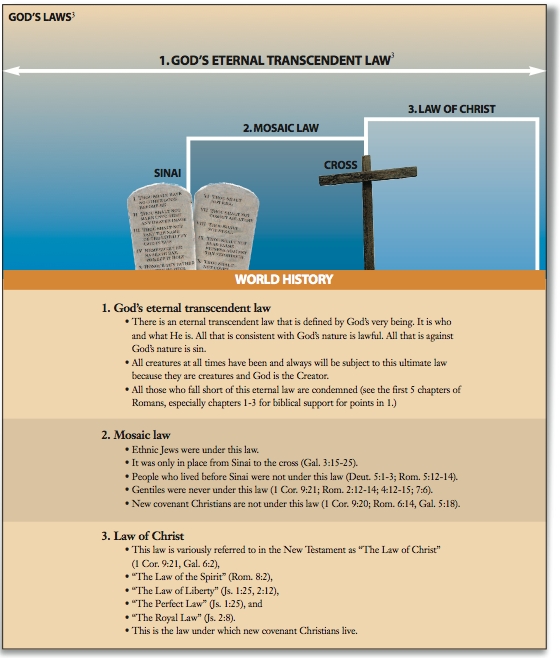
Summary
The seventh day Sabbath was given only to the children of Israel, along with all the other commands and ordinances comprising the entire law. This law containing shadows of the Gospel was given 430 years after the promise of Abraham until the Seed (Jesus) (Gal. 3:15-19). Now that the Substance has come, the shadows are all obsolete.
This seventh-day Sabbath was a reminder that the children of Israel were God's chosen people, rescued from slavery in Egypt, and brought to physical rest in the Land of Canaan. It also reminded them that God ceased from His work of creation which foreshadowed the coming rest of His completed work of salvation at the Cross. In a similar way, it reminded them of the perpetual rest Adam and Eve enjoyed in relationship with God until sin broke in, and foreshadowed that rest would be restored in Jesus through entering the believer's rest.
Jesus announced the fulfillment of the ultimate Sabbath, the Year of Jubilee, when he proclaimed the beginning of His ministry where the captives are released, and the oppressed are freed through the Gospel. Further, Jesus went out of His way to break the Sabbath as He did other ritual laws, thus showing that their shadows were no longer needed because He, the living Messiah to which they pointed, had come. He is Lord of the Sabbath—in other words, He is bigger than the Sabbath; the Sabbath is not bigger than Jesus; in Jesus the weekly Sabbath had met its fulfillment. God does not change Who He is, but He reveals Himself differently at different times. The Sabbath periods of time, like the other shadows, served a specific purpose and became obsolete upon fulfillment.
The believer's rest in Jesus is explained and contrasted with the seventh-day rest in Hebrews 4. Here we find that the seventh day was fixed at one time, but now another day is fixed, "Today". No one entered this spiritual rest through the physical seventh-day rest. This "Today rest" is our forever rest in Jesus entered when we believe by resting from our works to be made right with God and resting in Jesus' finished work in saving us.
An individual who focuses on the idea that the Christian Sabbath is a time period for their physical rest and spiritual renewal is not wrong according to the freedom the Christian individual has in the Gospel. It is, however, outside what the Bible teaches. Therefore, making any model of a required day mandatory or even recommended for Christians minimizes the Gospel by turning the Sabbath into "doing" instead of "resting" in Jesus' completed work. This focus on a physical Sabbath can also cause people to lose sight of the reality to which the shadow pointed in the first place—the beauty of perfect spiritual rest in an unbroken forever-relationship in Jesus.
The Sabbath commandment was so much more than just a day. It was important in that it pointed forward to the rest that was restored to us in Jesus. When we accept Jesus' blood as the payment for our sin, we are saved, and from that moment forward, Jesus is our Sabbath rest—"Today" and every day. †
Endnotes
- For a thorough study on the Sabbath from the "today" paradigm, see Ratzlaff, Dale, Sabbath in Christ, LAM Publications, LLC, 2010.
- Luther's Small Catechism with Explanation, Concordia Publishing House, 1986, pp. 66, 67.
- Lee, Chris, "A Study of the Covenants," http://www.lifeassuranceministries.org/studies/covenants/covenants14.html
![]()
Copyright 2011 Life Assurance Ministries, Inc., Casa Grande, Arizona, USA. All rights reserved. Revised December 3, 2011. Contact email: proclamation@gmail.com
October November December 2011
VOLUME 12, ISSUE 4